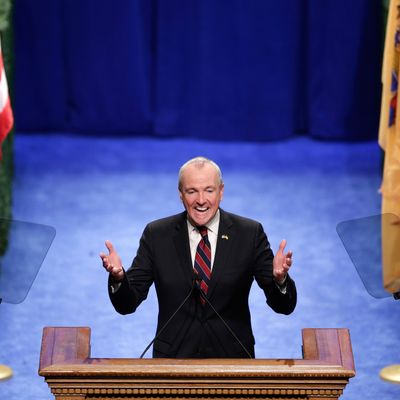
New Jersey is moving “full weed ahead” toward legalizing recreational marijuana. In his inauguration speech on Tuesday, newly elected Democratic governor Phil Murphy said that his vision for a “stronger and fairer New Jersey … includes a process to legalize marijuana,” as part of a broader package of criminal-justice reforms.
While Murphy frames his support for marijuana legalization primarily as a means of combating mass incarceration and racial disparities in criminal justice, there is also a fiscal component to his pitch: By some estimates, a legal pot market could provide the Garden State with an additional $300 million in revenue by 2020. Given New Jersey’s pension obligations, myriad public-sector needs, and already-high property and income taxes (which are set to bite harder, thanks to the GOP tax bill), the revenue argument for bringing the cannabis trade into the legitimate economy may prove the most salient.
Earlier this month, Attorney General Jeff Sessions reversed an Obama-era policy that had enabled states to pursue marijuana legalization without threat of federal interference (so long as they took measures to prevent reefer from getting into the hands of minors or criminal gangs). But Sessions’s memo still afforded U.S. Attorneys the prosecutorial discretion to leave dispensaries be. And, for the moment, they appear to be taking a laissez-faire approach to policing the weed trade in the eight states that have legalized recreational marijuana.
There are pockets of support for marijuana prohibition within the Democrat-controlled state legislature. But former governor Chris Christie had long been the primary obstacle to legalization. The president of New Jersey’s State Senate, Stephen Sweeney, is a staunch supporter of legalizing weed. Sweeney’s position empowers him to unilaterally decide which bills receive public hearings or floor votes, and the Senate president has vowed to put a pot bill on Murphy’s desk within the next 100 days.
Meanwhile, further up Route 9, New York governor Andrew Cuomo took a more tentative step toward making wacky tobacky available over the counter. In his annual address on the state budget on Tuesday, Cuomo implored lawmakers to fund a “feasibility study,” which would examine the costs, benefits, and legal risks of legalizing the recreational use of marijuana.
“This is an important topic,” Cuomo said, “and it would be nice to have some facts in the middle of the debate.” Cuomo’s proposed study would be conducted by the state’s Health Department, with the consultation of State Police (a point he was eager to emphasize).
The governor has previously expressed opposition to legalizing cannabis. “It’s a gateway drug, and marijuana leads to other drugs and there’s a lot of proof that that’s true,” Cuomo said last February. “There’s two sides to the argument. But I, as of this date, I am unconvinced on recreational marijuana.”
Cuomo’s decision to consider a change of heart is likely driven by the same combination of public opinion and budgetary pressure that’s pushing the Garden State toward legal greens. In November, a poll from Emerson College found that 62 percent of New Yorkers approved of legalizing marijuana for adult use. The survey also showed that taxing sales of legal weed was a far more popular way of closing the state’s $4.4 billion budget deficit than higher taxes, new tolls, or reduced education spending.
Of course, marijuana-tax revenue could not close that deficit by itself. Virtually every state in the union faces some kind of fiscal crisis, as a product of federal disinvestment and rising public-pension costs. Legalizing and taxing new vices is not a sustainable solution to that problem.
But, as Cuomo’s study will likely find, the case for legalizing marijuana is plenty strong, irrespective of its fiscal benefits. It simply does not make public-policy sense to create an unregulated black market for a popular substance that is less addictive, less fatal, and less likely to cause traffic accidents than alcohol. Bringing weed into the legitimate economy would take a major profit source away from violent drug cartels, while allowing American cops to spend less time disrupting the lives of soft-drug users and more time policing violent crime — in 2014, there were 700,993 marijuana arrests in the U.S., roughly 90 percent of which were attributed solely to possession. Such arrests aren’t merely a waste of law enforcement’s time and resources; they also perpetuate racial bias in America’s criminal-justice system. White and black Americans use marijuana at nearly identical rates — but African-Americans are nearly four times more likely to be arrested for possessing the drug. Meanwhile, the public-health costs of legalization appear to be fairly minor. In Colorado, the rate of marijuana use among teenagers has actually declined since the substance was legalized.
And multiple studies have found that when states expand access to legal marijuana, declines in painkiller abuse and related overdoses follow.
If New Jersey is smart enough to figure this one out, it shouldn’t take much longer for the Empire State to have its come to cannabis moment.






























